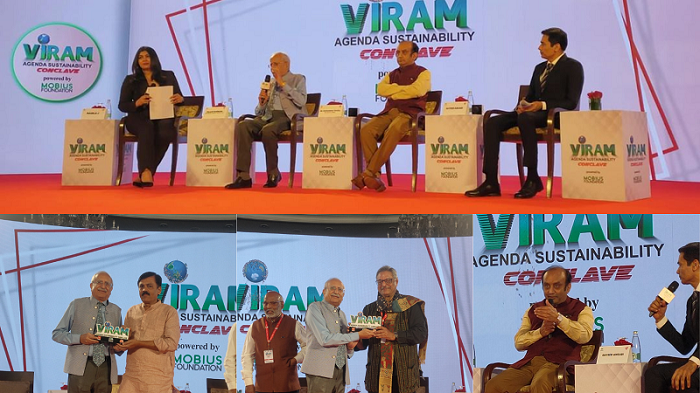Mobius Foundation, in partnership with ‘TV Today Network’, launched a one-year-long social cause initiative called ‘VIRAM- Agenda Sustainability’. The project was focused on the impact of overpopulation on the most pressing environmental problems of climate change, pollution, human health, habitat loss, over consumption of finite natural resources, such as fresh water, arable land and fossil fuels. Overpopulation also has an impact on housing, poverty, employment and education as well. The project aimed at creating awareness about these issues and urgency to take action, in the short and long term to conserve and protect nature and the mother earth, for the survival of humanity and other life forms. Although the general population is aware that the future looks bleak, the causes are not immediately apparent to the common person.
Every month, a total of twelve episodes addressing various environmental problems caused by excessive population growth were telecasted. The episodes can also be found on the YouTube channels of Lallantop, UP Tak, Bihar Tak, and Mobius Foundation.
Mobius Foundation culminated the campaign with an on-ground two-hour-long Thought Leadership Conclave. The event featured policy experts, demographic researchers, and academicians interacting under two robust sessions i.e. “Balancing the Global Equation: The Imperative of Overpopulation Stabilization” and ‘जनसंख्या स्थिरीकरण और पर्यावरण संसाधनों के बीच ताल- मेल की ज़रूरत’ along with an exclusive one-on-one fireside chat with Dr. Sudhanshu Trivedi, Member Rajya Sabha and Mr. Pradip Burman, Chairman, Mobius Foundation.
Dr. Sudhanshu Trivedi, chief guest at the conclave said that “We are becoming more and more numerous, but if we stick to our traditional knowledge system, managing the population and environment won’t be a problem. Traditional knowledge, also known as “local knowledge,” is a record of human achievement in understanding the complexities of life and survival in frequently hostile environments. Therefore, going back to our roots will enable us to create a sustainable future.”
Mr. Pradip Burman said “My vision is of a future in which our population co-exists in harmony with nature and prospers on a healthy planet, to the benefit of all., and which will only happen when our existing population stabilises or starts declining.”
Other dignitaries present at the conclave were G. V. L. Narasimha Rao, Member Rajya Sabha, Kiran Karnik, Padama Shri Awardee and Former President of National Association of Software (NASSCOM), Siddharth Kak, Indian documentary maker, television producer, and presenter, best known as the producer and presenter of Surabhi, Poonam Muttreja, Executive director Population Foundation of India, Akash Ranison, Co-founder & Director, Greener Earth Foundation and Arun Krishnamurthy- Environmentalist Foundation on India.
In the English and Hindi sessions, respectively, President Mr. Praveen Garg, Former Special Secretary, MoEFCC, Rtd. IAS and Dr. Ram Boojh, a former UNESCO representative and advisor to the Mobis Foundation, presented the organization’s vision for Population Stabilization. That is “Each one of us puts pressure on the natural world, consumes the Earth’s finite resources and contributes to climate change. One of the most effective ways that we can help our planet today is by choosing to have a smaller family.”
G. V. L. Narasimha Rao during the session said that Government of India has formed high power Committee for extensive consideration of the challenges arising from fast population growth and demographic changes. He further added the Committee will be mandated to make recommendation for overcoming the above challenges.
Kiran Karnik brough focus on women education as a tool to fight population growth and stated that the higher a woman’s level of education, the fewer children she has per woman. Compared to women with 12 years or more of education, who have an average of 1.8 children, uneducated women have an average of 2.8 children.
Siddharth Kak spoke about how media plays a crucial role in educating and making individuals, communities, and society conscious about sustainable development, the need for more sustainable patterns of production and consumption, the need for family planning and encouraging them to take action directed towards change and a more sustainable future.
Poonam Muttreja, said, States going through various stages of the demographic transition will require context-specific policies and programs due to the vast size of the country’s population and significant demographic variety.
Akash Ranison and Arun Krishnamurthy represented young individuals working in the field to improve the world one day at a time. They brought real-life problems to light while working on the ground and discussed how to dispel misunderstandings and barriers surrounding family planning among people.
About the Mobius Foundation:
The Mobius Foundation is a non-profit organisation, committed to supporting sustainability, empowering technologies, strengthening systems, encouraging healthy behaviour and focusing on education. The Foundation intends to create sustainable, culturally relevant solutions, enabling communities to break longstanding practices that are detrimental to human existence. The Mobius Foundation has been working in India since 2015, collaborating with a diverse range of civil society partners and NGO partners to contribute to achieving a sustainable India.

